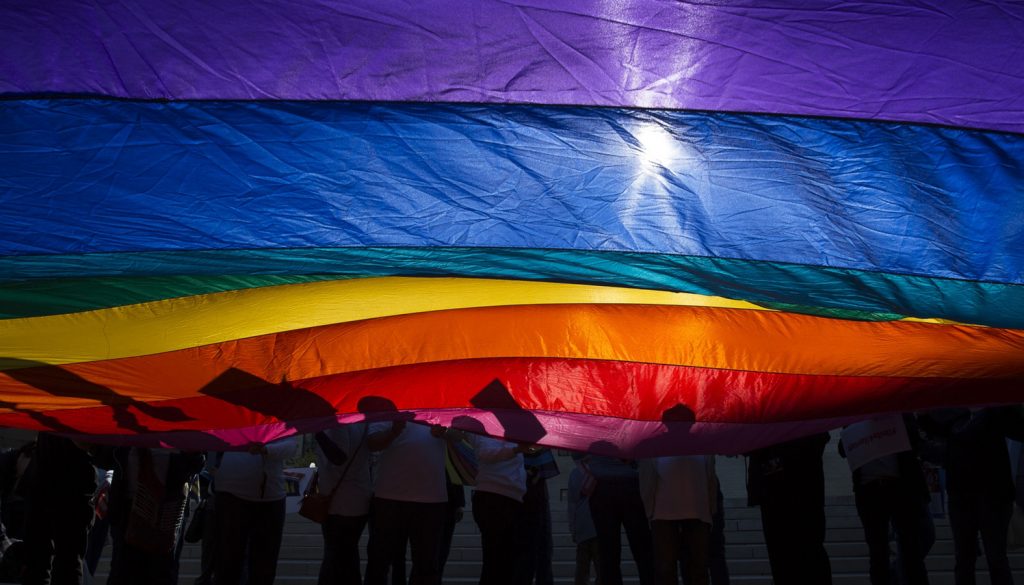Many people taking issue with the Church regarding sexual sin also use the same breath to declare that the Church has a “problem with sex.” With every pop-culture corner wallpapered in rainbow colors, I think it is arguable as to who has the problem that needs fixing.
All the flag-waving, and this huge cultural shift happening before our eyes, reminds me of the late Cardinal Francis George’s observation about a not-so-optimistic future. “I expect to die in bed, my successor will die in prison and his successor will die a martyr in the public square. His successor will pick up the shards of a ruined society and slowly help rebuild civilization, as the church has done so often in human history.”
Predicting the future is sketchy business.
When Paul Ehrlich wrote the “Population Bomb” in 1968, the Earth’s population was around 3.5 billion people, and 1 out of every 4 of them were hungry. Ehrlich predicted by the late 1980s that worldwide famines would devastate civilization.
Fifty-three years later, the Earth’s population is more than 7 billion and today, 1 in 10 of those people are hungry. That is still too many hungry people, but it is also tremendous progress, especially in the light of a population that has more than doubled since Ehrlich’s dire prediction. Thankfully, little of Ehrlich’s future came to pass.
But what of the present, of June 2021, where there is not a major corporation that has not integrated the colors of the rainbow into its logo, its social media platform, its retail outlet, and its legacy media advertising?
You cannot go to a sporting event in June without receiving the same messaging. If your child attends a public school, the cadence of the same drumbeat thumps loud and proud. If you stay home and turn on the television, it does not matter if you are watching a weather report or the National Geographic channel, you are going to see rainbows. I cannot drive down my own street without running a gauntlet of rainbow flags and yard signs.
And what if this June, or the June after this one, my neighbor or my mail carrier asks me where my rainbow flag is? Can I remain silent? Will my silence be interpreted as agreement with the concept of “Pride Month” or viewed with suspicion?
And what if I speak up and do a poor attempt of putting thousands of years of moral teaching from the Old and New Testament into a sound bite? Imagine if I were to reply to a neighbor about the pride someone in a same-sex relationship must have with this: “God blesses sinful man, so that he may recognize that he is part of his plan of love and allow himself to be changed by him.”
Pope Francis’ imprimatur on that quote notwithstanding, I could imagine a mob storming my front door with pitchforks and torches — and that would be a lot of family members and friends.
It is with that image in mind I cling to the second part of Cardinal George’s quote. Sooner or later, some successor of Cardinal George will find the “shards of a ruined civilization,” and will go about the rebuilding process. It has happened in the past, and I will go out on a predictive limb and declare it will happen again.
The question remains: When all of this happens, where will we be? Where will I be? Like the beautiful apocryphal tradition of St. Peter encountering Jesus on the road leading out of and into Rome, I will have the courage for my own “quo vadis” moment.
When it will happen, God knows. In the meantime, we will see without the gift of second sight how far and what form persecution may take. For now, the idea of a “red” martyrdom appears remote (he wrote hopefully).
But “white” martyrdom is here for the taking, and it certainly comes with its own brand of pain: economic damage, emotional suffering, loss of friendships, torn family bonds. I will therefore cling to the hope that with courage, firmly, and with a will to love and be compassionate, we can all still testify that pride is not a biblical virtue; it did Lucifer no good whatsoever.
And we can affirm, if there is anyone left to listen, that God absolutely loves everyone right where he finds them, but he loves them so much, he does not want to leave them there.

